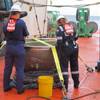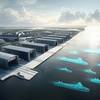Oceanfoil, Clarke Designs and UCL Continue Aerofoil Development
Oceanfoil, the maritime technology company developing aerofoil technology, announced the formation of partnerships with naval architects Owen Clarke Design LLP and University College London’s Energy Institute (UCL-Energy).
Oceanfoil will work with naval architects Owen Clarke Design LLP during the final design and engineering phase, leading to the manufacture of the working prototypes of the new improved wingsails for sea trials in the second half of 2014. UCL-Energy and Oceanfoil are developing analysis capability to maximise the performance of Oceanfoil’s technology on representative shipping routes, and which will enable Oceanfoil to predict the potential savings to be obtained from fitting Oceanfoil wingsails.
Following successful testing indicating that Oceanfoil’s revised and improved design can achieve reported savings in fuel consumption of up to 20%; Owen Clarke Design has been enlisted to lead the development of Oceanfoil’s wingsail technology aboard a vessel.
The new software being developed with UCL-Energy will rely on UCL-Energy’s unique data and modeling capabilities to enable Oceanfoil to demonstrate the fuel saving ability of a specific ship to potential customers, using the vessel’s details and known fuel consumption.
The partnerships underline Oceanfoil's strategy of working with industry leading specialists to achieve exceptional results and prove the fuel saving capabilities of their technology.
Aerofoils are designed to convert wind into forward thrust, using the same forces that give a wing lift, enabling a vessel to throttle down its main engine to save fuel and increase efficiency.
Charles Moray, Managing Director, Oceanfoil, said, “With the cost of fuel for ocean-going vessels at a sustained high level, our wingsail designs are ideally placed to capture a proportion of an industry craving fuel, emissions and cost savings amid increasing fuel costs and regulation.”
The ability to harness the wind as an additional power source to enable a reduction in fuel consumption is now verging on necessity if the maritime transport industry is to remain cost-efficient and offers exciting prospects for the fuel efficiency and significant cost savings within a matter of years.
oceanfoil.com
owenclarkedesign.com
bartlett.ucl.ac.uk/energy











